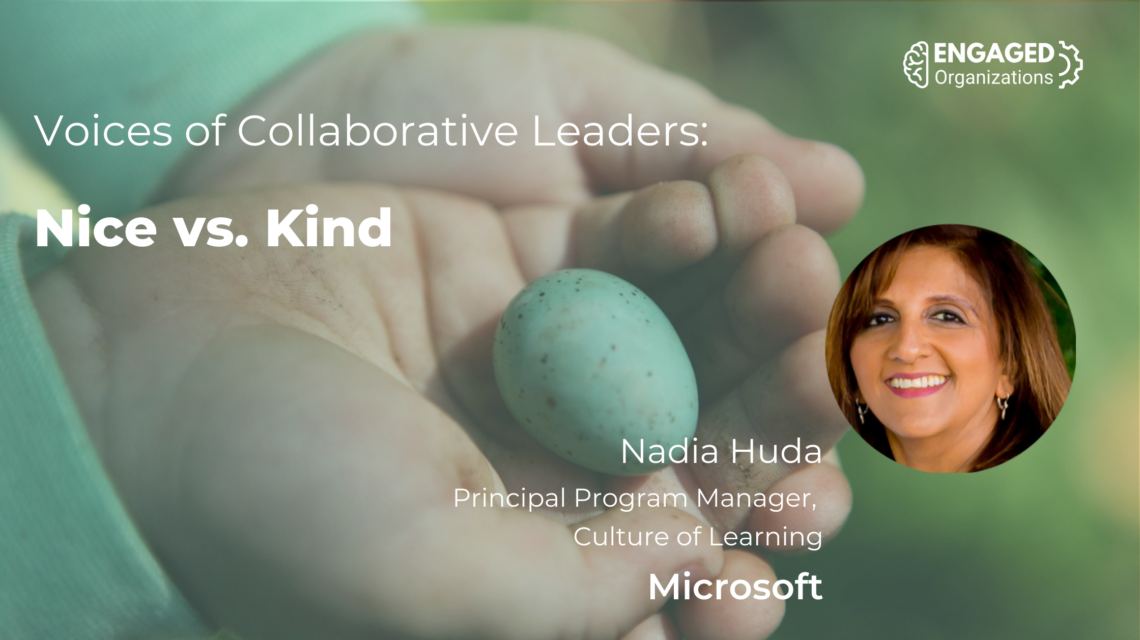Note: this is a new series of posts written by enterprise collaboration leaders who are reflecting on community-centric cultures – how to cultivate them, what’s required, challenges, opportunities, and their impact. If you are an enterprise collaboration or community program leader and would like to participate in this series, please email us at hello@engagedorgs.com.
By Nadia Huda
Yesterday I learned that although we use the words nice and kind interchangeably, there is an explicit difference. As I reflected back I recognized the need to know the differences explicitly and how it could have saved a lot of heartaches and mental agony caused by self-doubt in my life. But no problem I can learn today and be smarter going forward.
In my work strengthening collaborative networks in a large organization, this distinction made me wonder what the impact of nice vs. kind was not just on personal relationships but on organizational culture – so I dug in to see if there was related research and found a rich discussion and a lot of food for thought.
I believe a kind corporate culture emphasizes values of integrity and respect, while a nice culture emphasizes politeness and avoiding offending people. In the context of organizations and work environments, a culture of kindness vs. niceness can have huge implications on the psychological safety of its people.
Defining Nice and Kind
The Markkula Institute of Applied Ethics at Santa Clara University in Being Nice vs. Being Kind states that “If the underlying motivation is to create a favorable impression for the purpose of asking for a favor later, then the action can be considered nice due to its pleasing effect, but not kind without a sense of benevolence.”
More perspectives on the difference are offered in this blog post, Being Nice vs Kind – What’s The Difference? (8 Experts Explain).
“Being nice is most typically defined as: pleasant; agreeable; satisfactory… Nice is more about manners, culture, and general expectations of decent behavior to others. Kindness is about having our hearts in the right place. It’s about wanting the best for others and for ourselves. It has nothing to do with being liked.”
Sharon Gilchrest O’Neill
According to research published by Humankindex, leading with kindness is the most effective leadership style to drive innovation and competitive advantage; an organization is 5X more likely to be considered innovative if a company is kind and in those organizations, employees are 350% more likely to feel a shared sense of purpose between their job and the company’s leadership and goals.” It makes so much business sense!
To evaluate a culture for its kindness, the following questions may help:
- Does the culture feel human?
- What role does it play in diversity, inclusion and equity space?
- How does it impact knowledge equity in workplace?
Why a Kind Culture Matters
Why should we care that our organizations are kind? Does it really matter?
The Humankindex research suggests that employees are putting meaning over money- “The importance of finding meaning in their work remains more valuable than money among most employees, particularly among IT professionals and younger workers.” (6 out of 10 workers and 8 out of 10 workers in IT). If kindness, that is having a genuine interest in the well-being of others (not niceness), is promoted as a core cultural attribute and modeled by leadership, then intuitively it makes sense that kindness can be a magical quality with respect to the basic human need to have a sense of belonging. In a competitive hiring market, having a kind culture makes it easier to attract and, importantly, retain employees. It’s an organizational superpower.
According to 5 Reasons Social Connections Can Enhance Your Employee Wellness Program, “Abraham Maslow’s hierarchy of needs includes a sense of belonging as a major need that motivates human behavior – just like food, shelter, and safety. Employees with friends or social connections at work tend to be more engaged and loyal workers. This is because the quality of work relationships helps build a strong company culture that emphasizes respect, loyalty, and trust. Social connection provides a sense of cohesion in the office, which is essential for cultivating creativity, teamwork, and collaboration. Employees with positive relationships become more dedicated and motivated to perform their best.”
A sense of belonging is cultivated when a person feels welcome, respected, appreciated, and valued. In an environment where employees genuinely respect each other and want the best for one another, people are more likely to feel connected and are motivated to share learnings and experiences more readily creating knowledge equity. Collaboration and teamwork become frictionless and people feel empowered to deliver their best work, with a greater sense of accomplishment which in turn leads to happier employees with lower work-related stress.
It turns out that leading with kindness not only serves to reduce human suffering but also makes good business sense and delivers bottom-line results.



